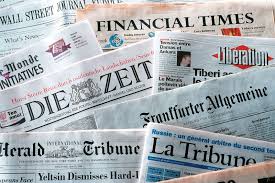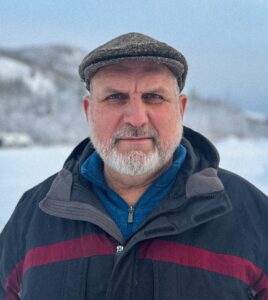 Media is the in-between, like medium or median: that which comes between two things. Media is thus the means by which reality (thing ONE) is conveyed to distant persons who, ostensibly, need-to-know (thing TWO).
Media is the in-between, like medium or median: that which comes between two things. Media is thus the means by which reality (thing ONE) is conveyed to distant persons who, ostensibly, need-to-know (thing TWO).
Newspapers, talking heads, journalists — these are the in-between ones that connect the rest of us with the reality they perceive, the reality they perceive to be important, the reality as they believe it to be true. Or too easily, the reality as they see it serves whatever greater purpose at hand.
An ancient dictum rings heavily in the air: “Thou shalt not bear false witness.” This is the challenge for all, not just institutional forms of media. Each of us must face down the temptation to construe reality as we wish it were, to give it a meaning it may not evince, to witness something and tell it in a way that serves we ourselves rather than Truth.
If there is an argument to view news with great care, if not avoid it altogether, this is one. There is no way to avoid that which is ‘between’ most reality and that which we read or hear. And that which is between will necessarily bear false – or incomplete — witness. Not with malice, we hope, nor on purpose: but unavoidably.
This happens most fundamentally in the choice of what to report and what to leave un-reported. And so we trust the media to give us what is worth knowing and leave off what is not.
This problem is as large as the whole, but it is often forgotten. When one realizes there is a world of knowledge unseen and that which is seen is selected by others, one may decide to avoid it altogether. For why should our understanding be shaped with such a filter, especially when the reality fed into the filter is, for the most part, absolutely beyond our reach and control?
I am asking (in an online newspaper, no less) if it really matters what we read of international affairs, for example. At the end of the day we will think and act with our primary principles in mind, and those are virtually impossible to change. If, as seems the case, news loses credibility in direct proportion to its breadth of proliferation, we cannot act or vote or think with a true understanding of the facts on the ground.
It comes down to the extent to which news comports with reality as you believe it to be – with said reality being shaped by that very news. And so you are back to your own premises and the news you trust, faulty as that may be.
 I cannot square this circle except with the most basic advice from my beloved Grandma: “Tend to your own front porch.”
I cannot square this circle except with the most basic advice from my beloved Grandma: “Tend to your own front porch.”
This feels like alien language in a world saturated with information that calls to all things beyond, most of which we can do nothing about. Does it help to know about such things? Perhaps. But how exactly? Certainly there are times action is prudent and we would never do the reasonable thing without information to justify it.
But tending to our own front porch is still primary, giving our heart to the things that make life worth living. We can see the importance of this in the most painful example of agitating for peace between countries when we can’t manage peace in our own homes.
Wisdom may reply that we can have both.
I suggest it is more simple yet. The only reason we can rightly fight for peace between nations is when we insist on it in our own homes. Otherwise we walk with a broken foot, succumbing to the perennial temptation of imagining we will fix other people’s problems while ignoring our own. None of us live nearly so well as we know we should – what makes us think we can fix someone else’s reality?
I think my Grandma echoed the Pauline epistle with her comment. Paul says we should learn to live quiet lives, and work with our hands so we can help others. I’m not sure I possess the wisdom to sort through all of this, but I believe Paul’s instruction is the starting point, and maybe the end as well. Home is what matters, not information as such, and certainly not knowledge of things we can do nothing about. In a fundamental sense, home is what makes everything else worth it. If we neglect it, what exactly are we fighting for?
I started to write this column knowing that I myself was attempting to be a medium for truth, and this is always the case. We do not see clearly, we are muddled, and the desire to serve our selfish ways is a temptation that is ever at the door. Yet, I dare to believe we can know what is right, what is bigger than us, and that we ignore to our peril.
This is my best attempt to say so, and to pray for grace to live accordingly.

Randy Huff and his wife lived for 5 years in Roanoke (Hollins) where they raised 2 sons. Randy served as Dean of Students at a Christian school and then worked in construction. For the last 8 years he has served as pastor of a church in North Pole, Alaska.
